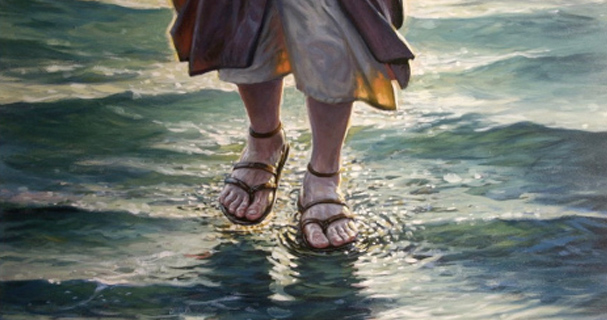Matthew 14:22-33 uniquely added in the books of the Gospel the famous story of Peter where he attempted to walk on water but began to sink as soon as he saw the wind and the big waves.
What lessons can we deduce from the story to enable us to understand more of God’s salvation?
1. We cannot be saved by our own efforts
We all know that Peter was a fisherman and basically he knew better than probably most of us how not to get drowned, or how to survive on a shipwreck. But no matter how hard he tried he could not save himself from the violent tides, not until he cried “Lord, please save me!”
The same is true with our salvation. Our own efforts are useless for our salvation. No matter how good we are; it does not guarantee our place in the new heaven and new earth. Our good works and mighty deeds for others, our diligent obedience to the laws, our zealousness in serving our church and fellow man, all these cannot save us.
Only when we acknowledge that Jesus is the lone Savior of our lives will then be our true, meaningful and perfect salvation starts.
No other entities on earth nor saints in heaven or other mediator, but Jesus alone can save us.
“Lord, please help me!” is a realization that our own efforts are futile, that we need Someone out of our own strength. Fortunately, that Someone who is always there ready to lift us up is proven and tested to be dependable. He is trustworthy and reliable despite our stubbornness.
2. God’s saving grace is given in an instant
Jesus’ hand is outstretched right away to lift Peter out from the water. That’s how God’s salvation works. It is always ready whenever we acknowledge the Source of its power.
The saving may not be an immediate answer to our current predicament, as it is more focused on our eternal salvation. So don’t expect that life on earth will be easier after calling out to Jesus. In fact, challenges will level up since the devil is not happy with that decision, but always remember that it is Jesus’ footprints that we see along the way, not ours, since He is carrying us throughout the journey.
3. There is rebuking along with the saving
Here’s what the Bible says when Jesus is on the act of saving Peter away from his sinking direction.
‘Immediately Jesus reached out his hand and caught him, saying to him, “You of little faith, why did you doubt?”’
And so we should expect admonitions and even chastisement along with God’s saving acts. This is for our own good.
It is not wise that we continue our wicked ways after God saved us. There should be a total change from the sinking behavior we are in, and that change should be from a willing and voluntary mindset.
This is where we should obey God’s words (or laws) which will then result to good works. Thus, our good works are not a means to salvation but rather a result of it. God saves us first which produces good works in our lives and to others.
Again, these are the three lessons we can learn from Peter’s experience on his attempt to follow Jesus on the water.
- That salvation is through Jesus alone and not by our own goodness or efforts, nor by others’ mediating for us.
- That God’s salvation is given freely and instantly.
- That there will be admonitions along with God’s saving grace to put us in the right track.
“Looking unto Jesus the author and finisher of our faith…” Hebrews 12:2

